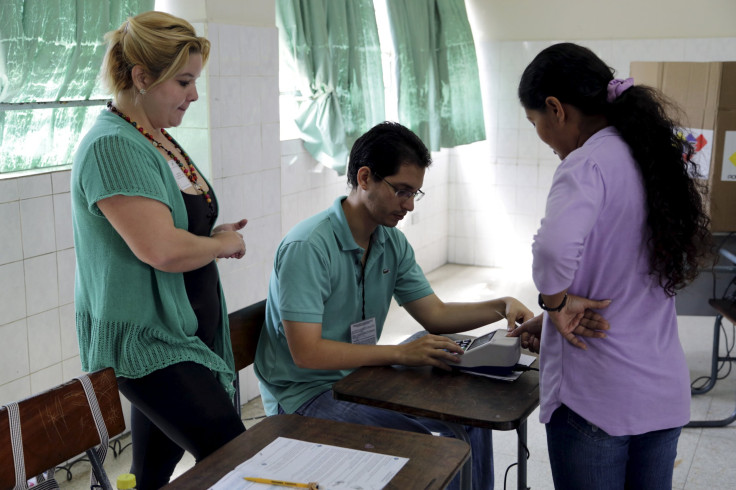Venezuela's Opposition Aims To Win Big In Legislative Elections

Venezuela’s widespread discontent over a slumping economy and the policies of President Nicolas Maduro is giving the political opposition its biggest chance in years to take back power. The opposition coalition is aiming for a big win in legislative elections planned for later this year, and some aim to recall Maduro if it wins enough seats. But with months to go before the vote, victory is anything but assured as both sides grapple with voter dissatisfaction and a risk of low turnout.
The opposition coalition, the Democratic Unity Roundtable (MUD), kicked off the campaign season Sunday through primary elections for about a third of the seats that will be contested in the legislative elections. The primaries saw victories for moderate candidates, including those from the party of former presidential challenger Henrique Capriles. Contenders for the remaining seats will be chosen by coalition consensus. Maduro’s United Socialist Party of Venezuela (PSUV) plans to hold its own primary next month. The legislative elections themselves are scheduled for later in the year although the government has yet to announce a date.
With dissatisfaction at an all-time high, the opposition is seeing its strongest chance for political power since Maduro was elected to office in 2013. Maduro’s popularity has slipped dramatically during his two years in office, with recent figures around 28 percent, according to Venezuelan research firm Datanalisis. The International Monetary Fund expects the economy to contract 7 percent this year as Venezuela suffers from last year’s drop in global crude oil prices and the financial squeeze from years of price controls. Widespread goods shortages, skyrocketing inflation and a bolivar that has surged to 300 to the dollar on the black market continue to fuel popular discontent.
Recent polls suggest the opposition could win a decisive victory if elections were held today. An analysis by Bank of America researchers in April projected the coalition could take two-thirds of the seats in the National Assembly if it maintains its current lead in the polls. That would give the opposition the supermajority it needs to decisively pass through agenda items. A simple majority would still allow it to wrest control of the National Assembly and challenge the president from a position of power -- and potentially launch a recall referendum against Maduro in 2016.
But the election is still a long way off, and it’s difficult to predict any outcomes in Venezuela’s highly polarized political climate. The opposition also faces an uphill battle, given the government has more campaigning resources and media access. The election also depends heavily on how the vote plays out in individual districts, so even if the opposition has more than 50 percent of national support, it wouldn’t necessarily translate into an electoral victory.
Harold Trinkunas, senior fellow and director of the Latin America Initiative at Brookings Institution, said mobilizing voter turnout will be the biggest challenge as both sides grapple with public dissatisfaction. “There’s a lot of distrust among opposition voters on the fairness of the vote, given the overwhelming presence of government in the media and the resources they can devote to campaigning, compared to the opposition,” he said. “On the other hand, the government has to worry about abstention on its side because its level of popular support is quite low.”
Analysts largely agree the opposition’s advantage in the election comes mainly from Maduro’s dwindling popularity, rather than its own inherent strength. “The opposition has had a perpetual challenge in creating an attractive message and reassuring people who had been supporting the government, or benefiting from the chavista government [dominated by supporters of the late Hugo Chavez], that they would continue to be treated the same way or receive the same benefits under an opposition government,” said Jennifer McCoy, director of the Global Studies Institute at Georgia State University.
The opposition has also traditionally struggled with presenting a united front, although the 29 disparate parties making up the MUD did coalesce around Capriles during his fight for the presidency against Maduro in 2013. That election was one of Venezuela’s closest presidential races, with Maduro edging out Capriles by less than 2 percentage points.
“Despite a lot of noise and a lot of drama in a certain sense, the opposition has managed over the last few elections to actually hang together when it comes to the actual campaign,” Trinkunas said. “I think they really have learned the lesson that unity is very important.”
Meanwhile, even if the opposition secures a victory, the Maduro government could still find a way to hold on to power. Earlier this year the National Assembly passed a so-called Enabling Law that gave Maduro powers to rule by decree on certain security-related issues. If the PSUV loses its control of the legislature, it could extend those powers for Maduro in other areas, allowing him to bypass the new legislature when it convenes next year.
But even if that happens, a win for the opposition by any scale would still be a big move for Venezuela. “It would change the political dynamic of the country, even if there were an enabling law passed,” McCoy said.
“No matter who wins the majority, if both sides get strong representation, the ideal is that the National Assembly [would] become a forum of real debate and negotiation, as a legislature should be,” she added. “But that’s an ideal -- and in a polarized society, that’s a high bar.”
© Copyright IBTimes 2025. All rights reserved.






















